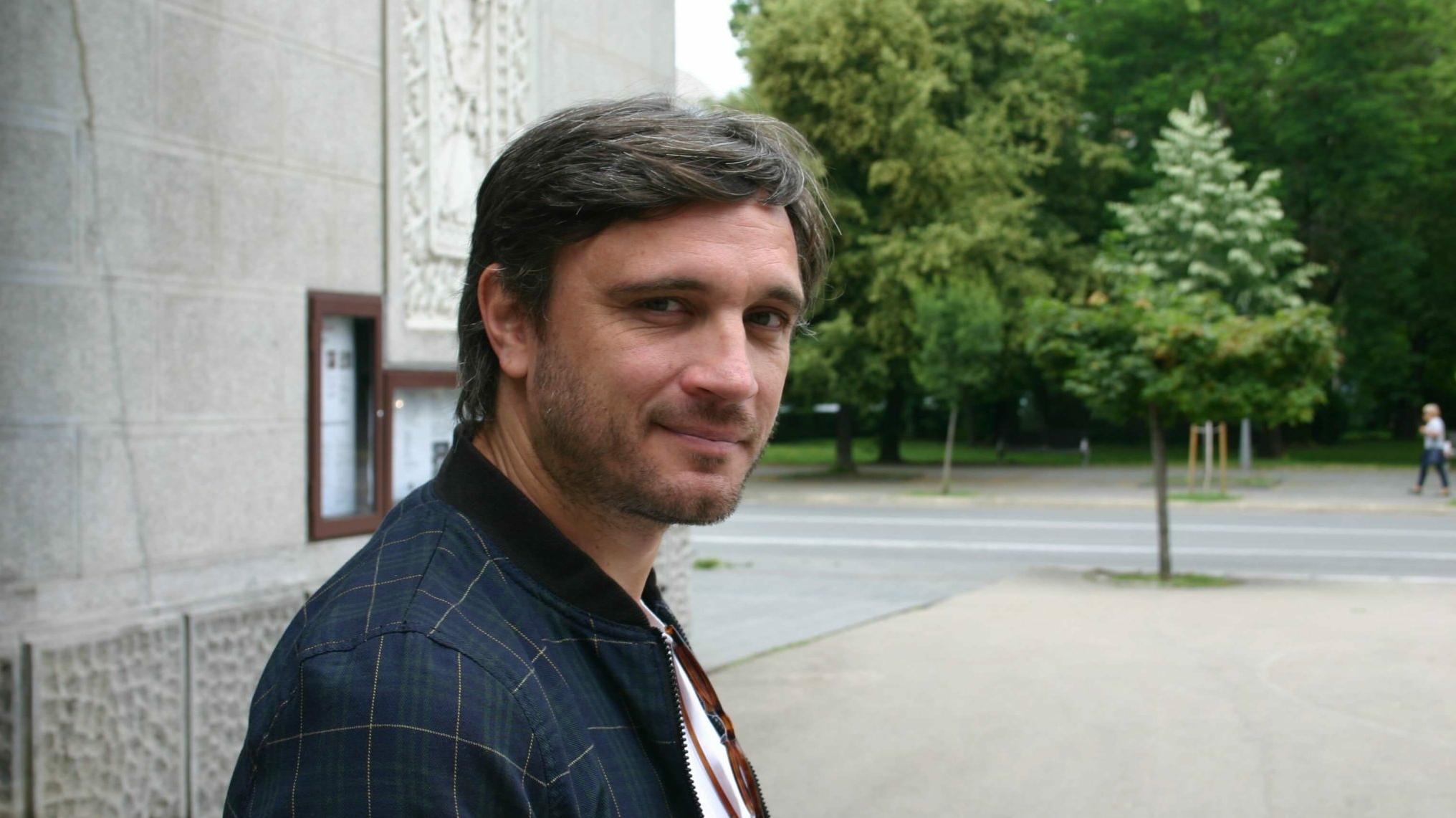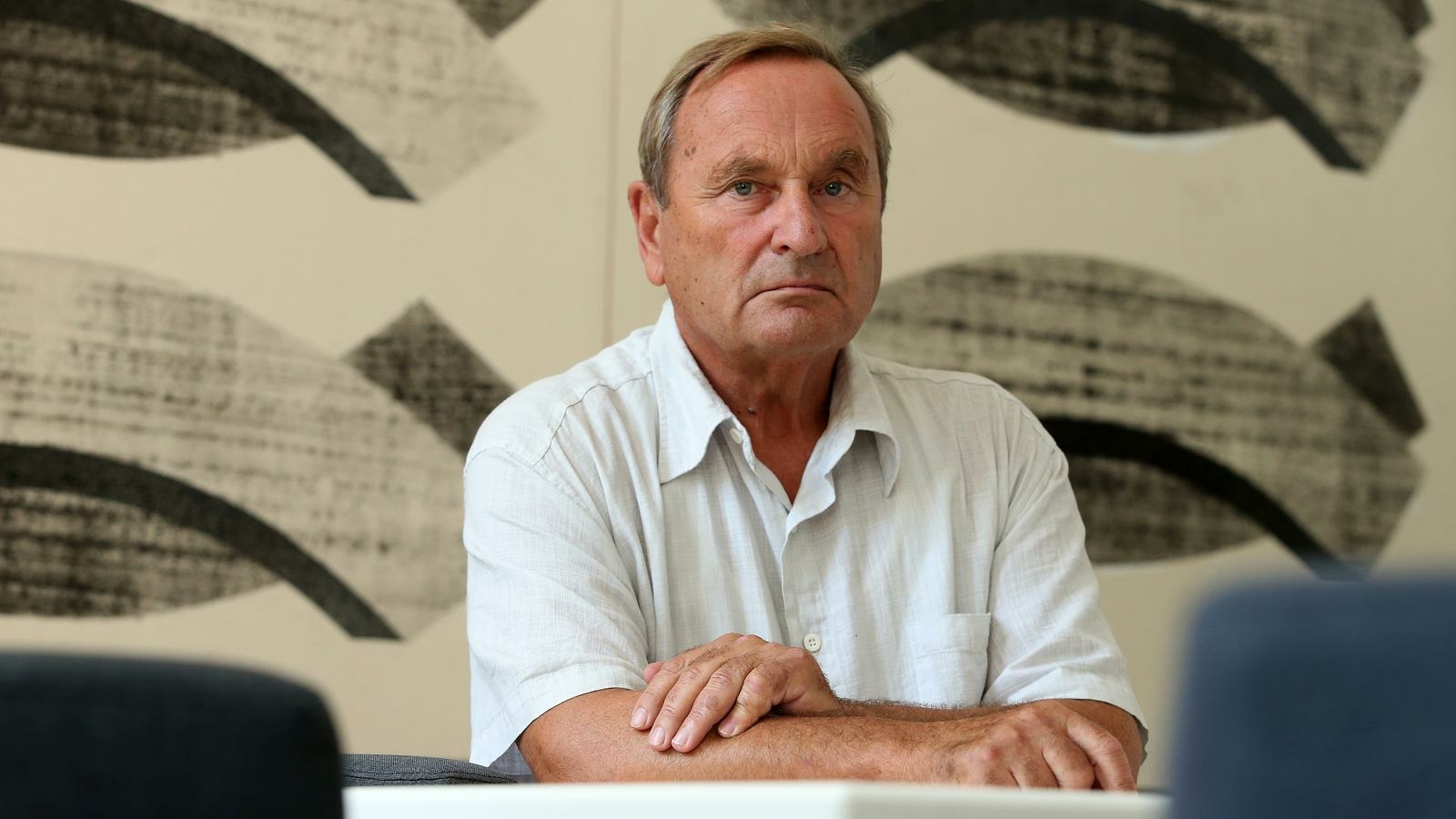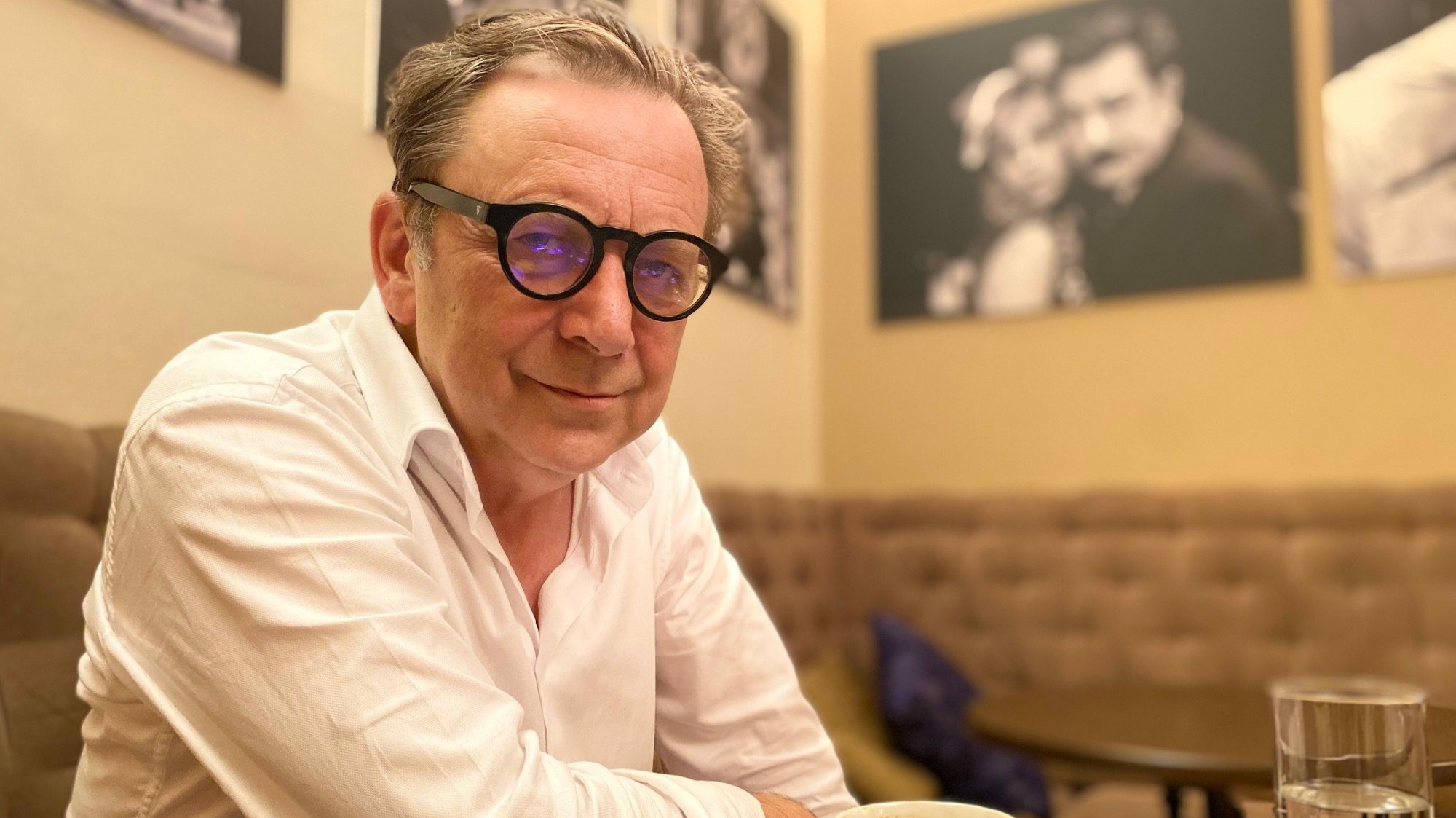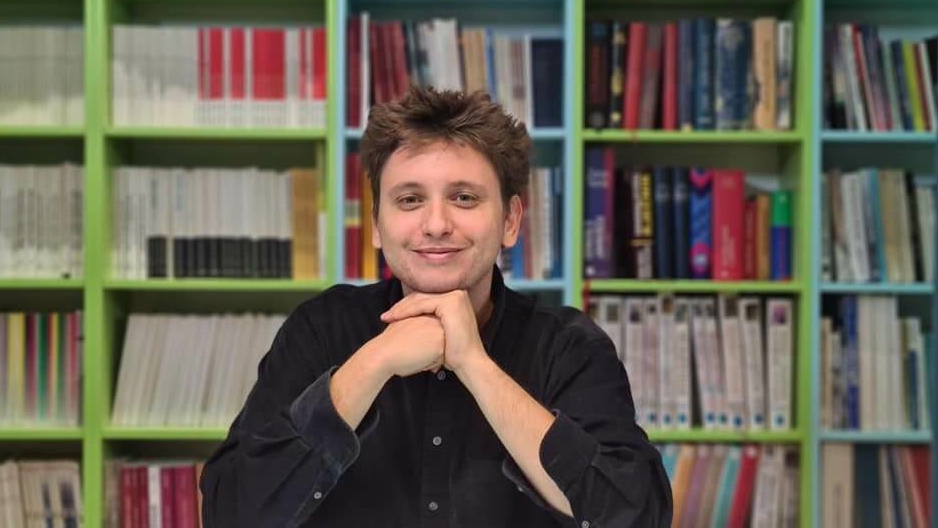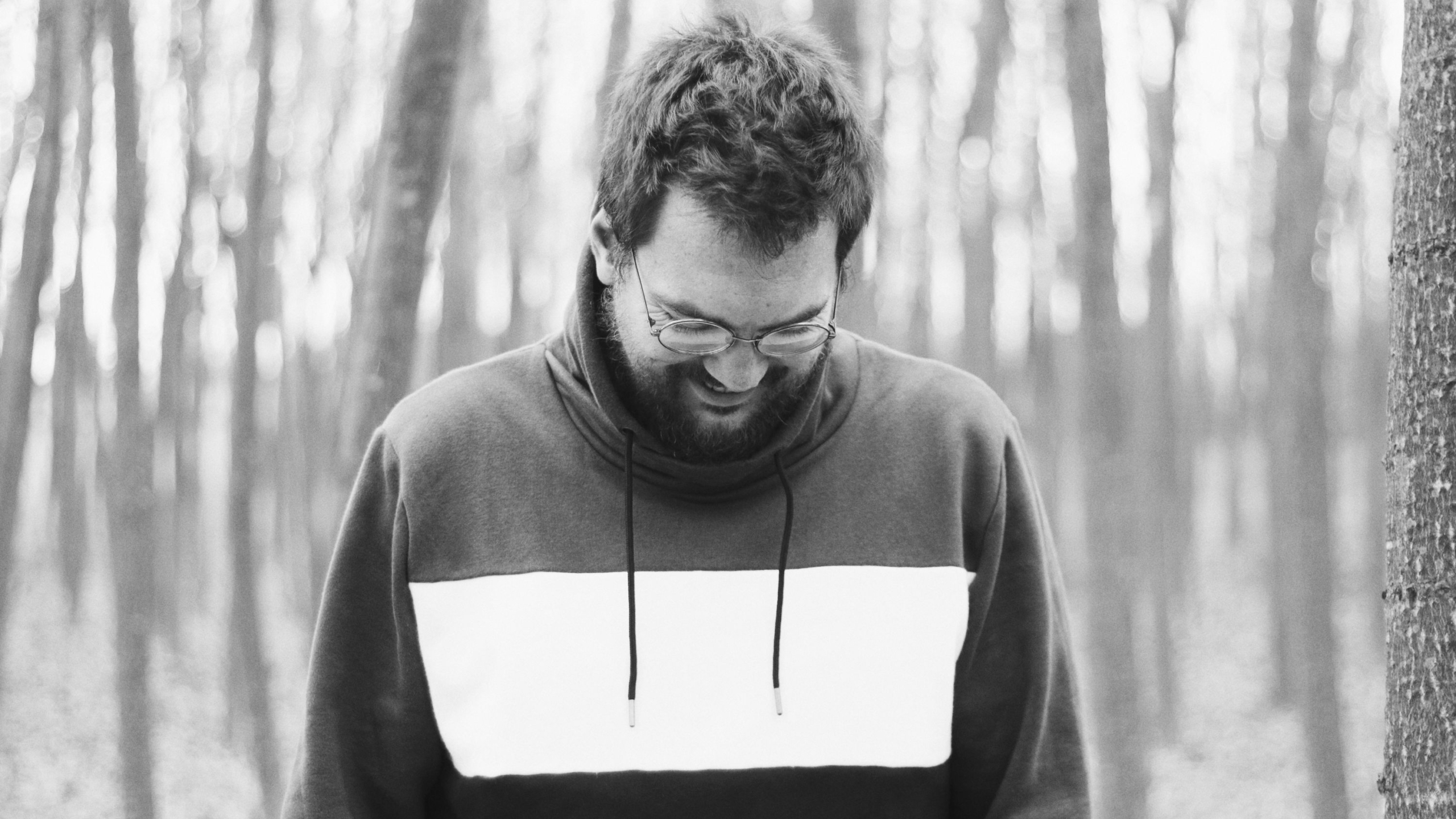While arranging and postponing this interview several times, I realized that a good and in-demand actor is fated to live as a vagabond constantly learning from new circumstances. The character of Mile Ilić in the film Dara of Jasenovac made Zlatan Vidović recognizable throughout the region and brought him other roles. One time I contacted him, he was in Valjevo, in military training. He needed the skills for a role. Another time, he was in Montenegro. He was filming the final scenes of the film Oluja. The third time, he was in Gradiška. He stayed only a day and then went back to Serbia to shoot. I hoped we would meet in Banja Luka during the Petar Kočić Theater Festival. So we did. We sat for coffee next to the National Theater of Republika Srpska, of which he is a member, and talked about some general and then some very specific topics.
You were born in Fojnica, but you don’t mention that anywhere. It’s interesting that you got your name there.
I was born in Fojnica by chance. My mother went into premature labor. She was traveling to Sarajevo; she was volunteering for the preparation of the Winter Olympic Games as a literature student. She had to stop in Fojnica to give birth. Impatient as always, I wanted to enter the world before my time. I was born in a convent. I barely survived. My mother gave the honor of naming me to the midwife that delivered me. “It is a golden child; let him be called Zlatan [‘golden’],” the nun said. And so I came into the world. And here I am, still bearing that name.
I won’t say that you leave a golden trail behind you, but you do leave results. It’s as if your name paves the way to success.
It’s all a combination of lucky circumstances and my persistence. I don’t start any work if I think I won’t be able to do it. My career, too, is the result of hard work rather than talent. Of course, you have to have at least a modicum of talent to find yourself in this business. But everything I have accomplished so far is the result of my steadfastness. And I truly enjoy what I do.
You mentioned your mother studied literature. How much did she influence your reading experience and your decision to become an actor?
We all read a lot in our house. We had a large attic with a lot of books, from Andrić, Selimović to Hemingway, Salinger and so on. Books significantly influenced my decision to get into acting. Especially during the war, when we would be without electricity for days. Books were then the only source of entertainment. In cold falls and winters, when we couldn’t go outside, I read books. Another influence on my decision to become an actor is the fact that my parents managed a video store for a while. I would read books as well as watch movies.
But your father steered you in a musical direction?
Yes. He played in Gradiška as a kid. He had a band, like all the hippies in those days. They were called Mir [“peace”] (laughter). Vinyl records and a guitar were always near at hand. This love of music strongly defines a person. Later, it sort of leads you through life. It opens certain new perspectives. I grew up on Pink Floyd, The Doors, The Rolling Stones, The Beatles. This wonderful music made me, I can freely say, a better person. Music has this power, as do film and literature.
To forgive, but not to forget
Gradiška is on the border. We are here on a border between worlds, civilizations, religions, cultures. And such places are often the scene of conflicts and wars. How much do those experiences influence you and the roles you take?
These experiences affect us subconsciously. They left their mark on us as people. Every child that grew up during the war was somehow affected. Some more, some less. As children, we can’t take in all that is happening around us. But later, when we are adults, it follows us through life in different ways. Of course I am affected by the fact that we had our classes in nuclear fallout shelters and recited poems there; that we ran to the shelter every two or three days; that there were power restrictions; that we had to go the country to escape the bombing of Gradiška on the border; that I waited for my father to return from the front. Or never to return? Today, I see all of that has made me tougher. In every sense. I see kids today. Thank God they don’t have that experience, and I hope they never will. They are so carefree today compared to how much we knew in those moments. We waited for power to be back on Wednesdays for two hours. Father came when he was on leave, every third weekend, if he came. We were used to not having money, not having this or that. That means a lot to me today because I know life is not all milk and honey. I am aware there are very difficult things in it. And again, I hope our children will never go through them.
Geography is an inevitable topic of this conversation. You have listened, I am sure, to family history. In the Second World War, Gradiška, like the entire Potkozarje area, endured suffering that is still indescribable.
Yes. We do not realize the extent of the pogrom that happened in the villages of Potkozarje, and in this entire unhappy region. It is incredible how we as a people have this evil fate and this simpleness and naivete that make us repeat the same mistakes. Our people, our ancestors, made enormous sacrifices so that, for example, you and I can sit here now, drink coffee and talk. We are not aware of the sacrifices that made that possible. When I was preparing for the role of Mile Ilić in Dara of Jasenovac, I read about those tragedies a lot. Those testimonies border on science fiction. The Germans were horrified by the massacres in Jasenovac and other death camps. And some today still want to make all that benign. But it can’t be benign.
Your grandparents surely remember the Second World War?
They remember. They told me about it. Many members of grandma’s family were killed. They were a large family. Grandpa’s relatives hid in his house. He was little, but he remembers some details and stories. They told me that the river Sava was constantly red during those years. It was red with human blood and full of corpses. When I imagine the river I grew up on like that, I feel sick. I hope we will be able to find peace, within ourselves primarily. I hope we will forgive, as Meša Selimović says, but not forget. That is the key to everything, in my opinion.
What were the reactions to and the reception of the film Dara of Jasenovac with the audiences? There was a media frenzy even before the premiere. A lot happened, from the Oscar candidacy to the involvement of politics and other non-artistic influences. How do you see it all, as a participant in this important movie and project?
How necessary and important this movie is is shown by the fact that it was seen by over three million people during its first run. That makes it the most viewed film event in history. I am proud of the team that found the strength, courage, patience and tenacity to pull it off. Only time will show how important this film is. There will be other films about Jasenovac and other places of death after it. This film broke down the barrier. I think we will now talk about this darkness more freely because we as a people realized we can also talk about our victims and suffering. There is no malice, no revenge and no asking for blood there; we simply want to show that we must not forget. Children today don’t know about Jasenovac. They don’t know about Gradina, about all that suffering and loss of life. Seeing the film Dara of Jasenovac, they hear about it for the first time. They learn something. They become aware of these events, terrible and unspeakable not just for Serbs but for all the nations in our region. That is the dark side of the people that committed those crimes, those individuals, that political structure, those ghosts of ideology, whatever they be. I think we should see it that way. That film, just like the film Quo Vadis, Aida?, should help all the nations to face their mistakes so that they are never repeated. It is high time we started learning from our mistakes and had life and not coexistence. Coexistence is not life. Coexistence is something artificial, forced. No one can make you love or not love God. That is something you want. In the same way, we must want to live together and not have these foreign representatives, or whatever they are called, teach us how to live. Phonies of the world with very high salaries teach us how to live and extend a hand of reconciliation to each other. With all our history, I believe we are smart enough and don’t need some third-rate clerk from Graz coming here and preaching to us.
What comments about the film and your character, Mile, do you remember?
I haven’t heard any comments about my character. But that is our affliction. I don’t know which foreign writer said that auto-chauvinism is a phenomenon he saw only in our people. It exists nowhere else but among Serbs. There were some auto-chauvinists who dissed the movie, saying is it no good because it sets our nations against each other again. By that logic, Schindler’s List also set the German and Jewish people against each other again.
People crave great thoughts
You have played many characters on stage and in film. We will mention those every highschooler knows from their literature classes: Raskolnikov, Ahmet Nurudin, historical figures Omer Pasha Latas and Veljko Čubrilović… The fates of individuals and peoples of this region and beyond are told through these characters. Working on such roles, do you become more aware of how much our present is informed by our past?
Everything comes back to us in cycles. I had the enormous luck to work on such texts as Crime and Punishment and Death and the Dervish, monumental works not only of Russian and Serbian but also of world literature. Death and the Dervish is one of the great works of world literature wrapped in a layer of Ottoman imperialism of the time. It is really an existential novel that deals with man’s fight with demons and mechanisms of power that crush us every day; add to that fights with dogmas about God, the divine and authority and the question of how to find our way in all this we call life. I am very grateful for the honor to speak these thoughts from the stage and have people listen to them. We need that daily. The auditorium is always packed when these plays are on. There is more demand that available seats. The people want such pieces. They crave great thoughts. In this age, almost everything is banalized and marginalized, and we are left alone with ourselves, spiteful, to chase money. We need the thoughts of Dostoevsky and Selimović more than ever to try to escape the grip of capitalism that offers no respite.
And this age distorts family dynamics and relationships.
That especially. I think we feel crushed and defeated in that sense. I hope it will change somehow. We still value family a lot here, which is great. The world neglects it more and more and gives more attention to the green god, the dollar, to material things, which are in essence nothing. If we sit here, and I have a million marks and you have one, it means nothing if we can’t have a conversation. Your mark and my million are in vain. We are both still alone.
The film and TV series Oluja. Another difficult historical topic, a national tragedy we witnessed in our time. How do you bear that burden, as a member of the people that went through it and as an actor who relives it all reading the script and building his character?
I was offered a role in Oluja not long after Dara of Jasenovac. I pondered for a long time whether to accept it. These two subjects are among the five or six most important subjects – certainly of the 20th century – for our people, including all the tragedies. I asked myself if I was capable, if I had the strength, if I was the one who should accept that burden and that honor. Finally, I read the script, which is truly great. I had long and frequent conversations with the director Miloš Radunović. And I realized it was something I had to do. I was entrusted with the responsibility. I would be a coward if I didn’t do it and didn’t do right by myself. I think I would regret it my whole life. Now, I am very happy that I accepted the role. I think we did a great and honest job. And audiences will finally be able to see it in the fall.
Looking at the films and theatre pieces produced in the region, those numerous coproductions made by people and money from the former republics of Yugoslavia with the addition of foreign funds, one gets the impression that most actors build their careers and regional recognizability through projects which are, to put it mildly, the line of least resistance. With you, it is the other way around. Have you thought about how much roles as those in Dara of Jasenovac or Oluja can jeopardize your regional career? Should a self-aware person and artist, rooted in his national being and identity, even think about such things?
One of our greatest actors, Nebojša Glogovac, played Draža Mihajlović. At the same time, he starred in The Constitution. Therefore, I believe an actor is only as strong as he is prepared to defend his beliefs and stand behind them and behind a well-written role. An actor is not necessarily a nationalist if he plays Draža Mihajlović, as Glogovac did. He then played a completely different role in another film. And he played both roles superbly. That is his accomplishment. That is the accomplishment of the actor’s being. I never feared I would be marked by these projects, like, for example, the late Bata Živojinović. I was only interested in whether the role was well-written, whether the script was good and whether I could stand behind it as a being. And I am not a one-dimensional person. I observe everything I do from different perspectives. Only a well-acted role is the measure of your work. Just like for a car mechanic. Did he do a good job fixing the car or not? It doesn’t matter what religion or nationality he is.
Let us move from the region to the world. You are in Terrence Malick’s The Way of the Wind. It is still in editing. What is your experience of working with one of Hollywood’s and world’s greatest filmmakers?
He is known for spending more time editing than shooting his films. I had the honor of acting in a film of one of my favorite directors. It all seemed like a dream. My part was shot in Rome. Terrence Malick is, so to speak, one of Hollywood’s last samurai who truly makes films for the sake of films, for himself and not for the big studios, to make blockbusters or to make a lot of money. Still today, appearing in his film is a matter of prestige. Many Hollywood actors, from Brad Pitt to others, knocked on the director’s door to ask to be in one of his films. For me, it was a dream from my student days coming true. I was fascinated by his films as a student.
You play a Roman centurion who stabs Peter the Apostle with his spear?
Yes. He experiences a transformation after that. He becomes a believer. He realizes how strong Saint Peter’s faith is and how it all transcends the earthly dimension. He goes through a kind of catharsis. A small but very interesting role.
It seems that the roles that find you have at their core love, forgiveness, faith in humanity.
Exactly. There is always a strong emotion present, and it’s all connected with the purification of the soul and of the whole being. All the characters I’ve played go through very difficult circumstances and situations. And they still emerge from them purified and more at peace. I hope that my life will also be like that, that I will find my peace somewhere. I wish that for everyone. It sounds clichéd, but we live in troubled, turbulent times. When you find the time to have a coffee, to take a break, you should be happy.
An illusion of freedom
The docufiction film The Family Album of the Čubrilović Family, in which you play Veljko Čubrilović, one of the principal organizers of the assassination of Archduke Franz Ferdinand, is very important for Gradiška, BiH and the entire former Yugoslavia. What is important is, again, collective memory, honoring those who gave their lives for the freedom of their compatriots. Are there such figures today?
Veljko Čubrilović was first and foremost a teacher, an educator who worked to preserve and spread literacy among the citizens. After that, he was a Young Bosnian whose spirit wanted us to break free of the bondage, of the submission that smothered us for many years. He fought with all his heart and paid for it with his life. Nowadays, such people who are ready to die for their ideals, to make other people better through them, are fewer and fewer. This film and all other films about this topic are very important because we are slowly but surely forgetting the great people from our past. Not only great warriors but also people from culture, education, medicine. And, thankfully, there were many. I hope someone will realize that is our duty. We will then have new people like Čubrilović but with a happy ending.
We are talking about the period of the First World War. Are we free today, or is this only an illusion of freedom?
I think we are not free. We are in a kind of physical and mental reservation. We are not open as people, especially since we need visas to go anywhere, have to read a million laws and have to listen to someone who doesn’t know our language. It all constrains us. And we apathetically say: “It’s fine as long as they don’t beat us.” We’ve been through worse times, so this is now tolerable. But we are actually like that frog in boiling water. They give us some money to survive. They give us an illusion of freedom so we can post our opinions on social media. Essentially, we are stuck. It is worse than ten years ago. Young people are anesthetized. They don’t travel. They listen to music which isn’t music. They don’t meet people from other cultures. They aren’t having new experiences. They are fine with being penned up. Or they go abroad to work and be second-class citizens. You can’t be a first-class citizen there, just as I will never be able to play Ahmed Nurudin or Raskolnikov there. The cultural and linguistic barriers are huge. We should learn and take in as much as we can while preserving and honoring our own. That is patriotism for me. Not nationalism but patriotism.
Translation from Croatian: Jelena Šimpraga
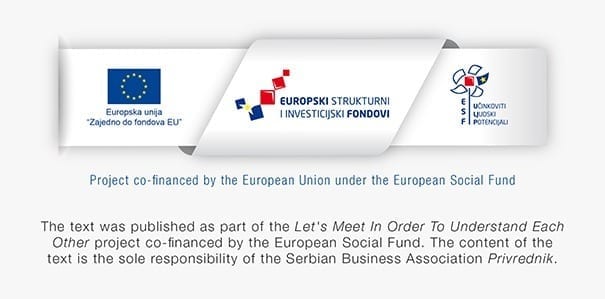
This post is also available in: Hrvatski

